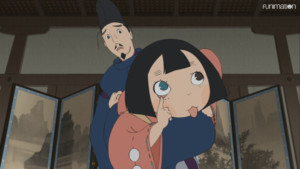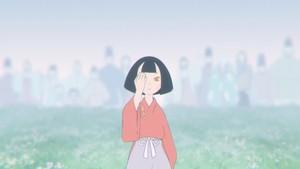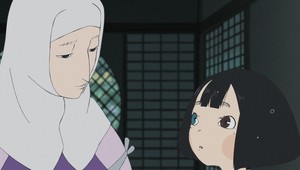The Fall 2021 Preview Guide
The Heike Story
How would you rate episode 1 of
The Heike Story ?
Community score: 4.3
How would you rate episode 2 of
The Heike Story ?
Community score: 4.4
How would you rate episode 3 of
The Heike Story ?
Community score: 4.5
What is this?

A young orphan named Biwa is taken in by the powerful Taira Clan—also known as the Heike—after their leader witnesses her extraordinary psychic abilities. Unfortunately, what she predicts is a future of bloodshed, violence, and civil war.
The Heike Story is based on Hideo Furukawa's Heike Monogatari novel and streams on Funimation on Wednesdays.
How was the first episode?
 Caitlin Moore
Caitlin Moore
Rating:
For a while, I felt like one of a very small contingent of anime fans who didn't care for Naoko Yamada's work. I found K-ON insipid, never got into Tamako Market, and couldn't make it all the way through A Silent Voice even though I liked the manga. However, when Heike Story was announced only a few short weeks before its premiere, I found myself intrigued - what would Yamada's direction look like outside of Kyoto Animation's fairly limited aesthetic palette, at the more avant-garde studio Science SARU? What would result from a female director best known for intimate, female-focused stories, taking on a centuries-old military epic?
Turns out, whatever it is, I'm into it in a big way.
I'm not going to pretend to have more than the slightest familiarity with The Tale of Heike, the story of the multi-generational conflict between the Taira and Minamoto clans that rocked Heian-era Japan. That sentence right there? That's pretty much all I know, and even then I gleaned it from Wikipedia just before watching the episode. However, something tells me it's not about a gender non-conforming biwa (Japanese lute) player that Shigemori, the son of the Taira patriarch, took in after his family's thugs killed their father. And yet, here we are.
This is the kind of series where I could easily write an entire essay based just on the first episode; for someone like me, who loves critically analyzing anime, it's practically a feast even as it's clear to me that my ignorance of the source material will limit my understanding of even a loose adaptation like this. Through Biwa, Yamada and the veteran screenwriter Reiko Yoshida look to be challenging this ancient story of high-born masculine values with characters that exist on the margins of a highly patriarchal society.
What's more, I feel like I finally get what the big fuss over Yamada is about. The close attention to body language — yes, including feet — deliberate frame composition and camera focus, and melding of sight and sound that she's developed a reputation for are all on display here, with grittier art and storytelling that may very well appeal to those of us who always found KyoAni's style a little too highly polished and distancing. The voice cast is nothing but all-stars, from old-timers like Shigeru Chiba and Kikuko Inoue to more recently prominent names like Saori Hayami and Aoi Yūki.
Heike Story kicks off the fall season in an unbelievably powerful way, and the premieres that follow will be hard-pressed to meet its high bar. I can't wait to see where it goes.
 Nicholas Dupree
Nicholas Dupree
Rating:
I'm of two major impressions on The Heike Story, as of their first two episodes. On the one hand, I feel decidedly under-educated and too out of the loop to understand its nuts & bolts story right now. I have no familiarity with the epic literature it's adapting and/or re-imagining, and only a passing understanding of the history it's built around. Much of my experience with this early premiere was just piecing together the basics of the political jockeying going on around Biwa and her new family. I gather there's a powerful family known as the Heike who have built considerable but controversial influence in the government, there are dueling alliances within said family, and a strong undertone of struggle between law and religion broiling underneath it all. I imagine (and hope) things will get clearer as the series continues, but it has no patience for holding my hand, so I better start building a character chart to keep names straight, as right now the only way I can tell the two different bald old guys apart is by the width of their eyebrows.
Usually feeling that in over my head would be alienating for getting into a new show, and that's partially true, but it's largely counteracted by the sheer atmosphere and personality of the production. Naoko Yamada may be working with a new team and house style at Science SARU, but her dedication to delicate and expressive character animation is unmistakable. SARU's previous works have been generally experimental, often minimalist with their art design, but could at times feel too abstract or alienating in their simplicity. Here, combined with the warmth and humanity Yamada's directorial eye brings, Heike Story is absolutely dripping with a welcoming, enveloping atmosphere. Characters move and emote with an abiding gentleness that resonates through the screen in its strongest moments, so even if I don't fully grok the particulars of what characters are talking about, the emotions at play are never in question.
That's especially true of Biwa, the prophetic little girl at the center of this show, whom I gather is an addition unique to this production. Her visions of the future make for startling contrasts to the relatively peaceful and static present, most especially as her foresight gets the best of her at the end of episode two, and the violent destiny of her adoptive aunt plays out in chaotic snippets. It's that understated yet inescapable harshness that really sells the otherwise contemplative storytelling so far. The Heike Story may play at times like a dry political account, but Biwa's prophecies and her fear assure us there is tumult on the horizon that will tear these pastoral moments to shreds far too soon. And with how human even the least developed of the cast feel already, that's sure to be both heartbreaking and enthralling.
Altogether, I was very much taken by this premiere, even if I would struggle to explain the actual plot. But the magic of animation is that, with the right delivery, you can overcome near any culture gap and become enthralled nonetheless. And with a production as rock-solid as we have here, this is definitely one to watch.
 Richard Eisenbeis
Richard Eisenbeis
Rating:
The Tale of the Heike is one of the classics of Japanese literature. It is a historical epic set in the twelfth century that follows the Taira family's rise to power and subsequent fall to ruin. On one hand, it is a heroic story filled with all the fighting and drama you would expect. On the other hand, it is also a story centered on Buddhist themes such as duty and Dharma. One interesting thing about the original tale is that it is part of an oral storytelling tradition—that of the Biwa Hōshi. The Biwa Hōshi played their lute-like biwa instruments as they recited the tale across the centuries, which brings us to The Heike Story. The anime is told from the viewpoint of our fictional protagonist “Biwa”—the young Biwa Hōshi who would go on to create the epic after living through it.
The first episode introduces us to Biwa, explaining her past and how she becomes involved in the story. Biwa is a surprisingly complex character. She is torn between wanting revenge for her murdered father and the kindness Shigemori gives to her. More than that, the two share a true emotional connection due to their supernatural eyes; Shigemori is perhaps the only one that can understand the pain and loneliness that comes from seeing what others can't. Thus, the anime clearly establishes Biwa's dilemma from the start: does she do nothing and get her revenge on the Taira, or does she fight fate and try to save the one Taira worth saving?
The second episode is where it gets personal. As country-changing events happen around her, Biwa gets something she thought she lost: a family. Through her relationship with Tokuko, she comes to accept that good things can happen in the future. Moreover, both she and Shigemori learn to appreciate the present despite being haunted by specters of the past and visions of the future. It's both a heart-wrenching and beautiful episode. However, it also highlights the glaring issue with the series.
While the emotional core of the series is easy to understand, the political ongoings are not. Names, places, priest orders, familial relationships, means of punishment and asking for forgiveness—all of this is treated as if it's obvious common knowledge. And while this may be less of an issue to the average Japanese viewer thanks to general education and cultural osmosis, it's a barrier to entry for the rest of us. Honestly, to get the most out of this show, you'll likely need to pause constantly to take notes. Still, that's a small price to pay for an amazing retelling of one of Japan's great classics.
 James Beckett
James Beckett
Rating:
I'm a sucker for aesthetics, and The Heike Story is just so overflowing with technical skill, not to mention sheer confidence in its own vision, that there was never really any chance that I wasn't going to love it. Science SARU is one of the most exciting and innovative studios working in the industry right now, and their talents are being deftly guided by director Naoko Yamada and writer Reiko Yoshida, whose creative chemistry burns hot underneath practically every scene in The Heike Story. The animation in these first two episodes is lush and brimming with subtle emotion, and the world of the story seems plucked straight from the Japanese scrolls and woodcarvings of ages past. This is very appropriate, seeing as how important the original Tale of the Heike is to Japan's history and artistic heritage.
That historical legacy has the potential to be a strength and a weakness, depending on the viewer. Personally, as much as I love learning about Japanese history and landmark works of literature, I'll be the first to admit that centuries'-old texts don't make for the friendliest reading experiences. The Heike Story is the kind of complex chronicle that truly earns its “epic” descriptor, too. I have a hard enough time with the kind of labyrinthine political dramas that get produced in the 21 st -century—after only a couple of episodes, I'm already struggling to follow the many threads that weave in and out of the Taira clan's lives.
What makes The Heike Story especially enticing, then, is its inclusion of an original perspective character, who in this instance is the precocious and fiery young soothsayer, Biwa. She is a delightful protagonist in her own right, expertly voiced by Aoi Yūki, and the relationships she forms with Shigemori, Tokuko, and Gio are what give these episodes enough heft to complement its gorgeous visuals. I'm not very invested in the political or military struggles that Shigemori has to navigate, but his growing bond with Biwa is just the motivation I need to sit down and take some notes, if that's what it's going to take to follow this story. Likewise, I had to do some outside research after watching the premiere to follow what exactly was going on with Gio's sudden turn to devout Buddhism at the end of Episode 2, but I had no trouble tracking how this sudden and melancholy change affected Biwa.
It's quite possible that this anime will end up being too dense and culturally specific for me to fall completely head over heels for, since it can be hard to lose yourself in a show that practically demands extra homework just to fully appreciate. Then again, some of my favorite works of art ever are the ones that demanded that I put in the work to meet them on their level, and have stuck in my head ever since. With any luck, that's exactly what The Heike Story will do.
 Rebecca Silverman
Rebecca Silverman
Rating:
It's probably no surprise that I loved this. Not only is it based on one of the classics of Japanese literature, which I've read a few times in various editions, but it's also clear that the creators of the show respect and enjoy the original novel as well. While we'd all hope that would be the case with all adaptations, it sadly isn't, and this story in particular truly deserves that – in no small part because there's just so much going on.
Because the original Heike Monogatari is so packed with action and characters, it was a very good idea to provide viewers, who may not have read the source text, with an original character to follow. That would be Biwa, a young girl who, previous to the story's start, traveled with her blind father. He disguised her as a boy (a safety precaution) and never told her her name, so when she's taken in after his murder by a member of the Taira family (an alternate reading of “Taira” is “Heike”), she simply chooses to name herself after the instrument her father played. Biwa, as an orphan of the lower class, has been largely removed from the political machinations that the other characters have grown up with, so seeing them play out before her eyes is somewhat overwhelming. That's something captured very well here – Biwa enters the story with her father murdered by the Taira patriarch's men, approaches the family full of rage, and slowly comes to realize that there's a lot more nuance to the entire situation than she ever realized. Since that's how I felt when I first read the original book, it's a good way to capture the scale of the story.
These episodes do introduce a fairly large cast (and trust me, it's only getting bigger from here), but they do a good job of keeping everyone straight. Mostly this is because of Biwa again; she's drawn to or repulsed by different characters, and those become our focus as well. It's particularly noticeable in the case of Gio, a shirabiyoshi (type of dancer) whose story is among the most famous in the beginning of the book, and Tokuko, Shigemori's younger sister. Tokuko, it's worth noting, is present throughout the entire 800-page book, and in these episodes she and Gio become emblematic of how little control women have over their lives – Gio's escape is by taking the veil, while Tokuko seems to accept what is expected of her.
The supernatural elements, where Biwa can see the future through her blue eye and Shigemori can see the dead through his lighter-colored eye, feel largely symbolic at this point. That's not a bad thing, and it does create a link between Biwa and her foster father. It also works with the pale beauty of the art, which uses color in ways that truly compliment the story, including mimicking the look of the original (or at least early) illustrations for flashbacks. Given that Funimation's subtitles feel relatively close to Tyler's translation at times, particularly during the sung sections, that feels especially fitting, as do the segments of what appears to be an older Biwa singing excerpts from the book. It's simply a well thought out, intelligent adaptation, and while The Tale of Genji will always be my favorite classic Japanese novel, I'm very much looking forward to immersing myself in this.
discuss this in the forum (250 posts) |
this article has been modified since it was originally posted; see change history
back to The Fall 2021 Preview Guide
Season Preview Guide homepage / archives